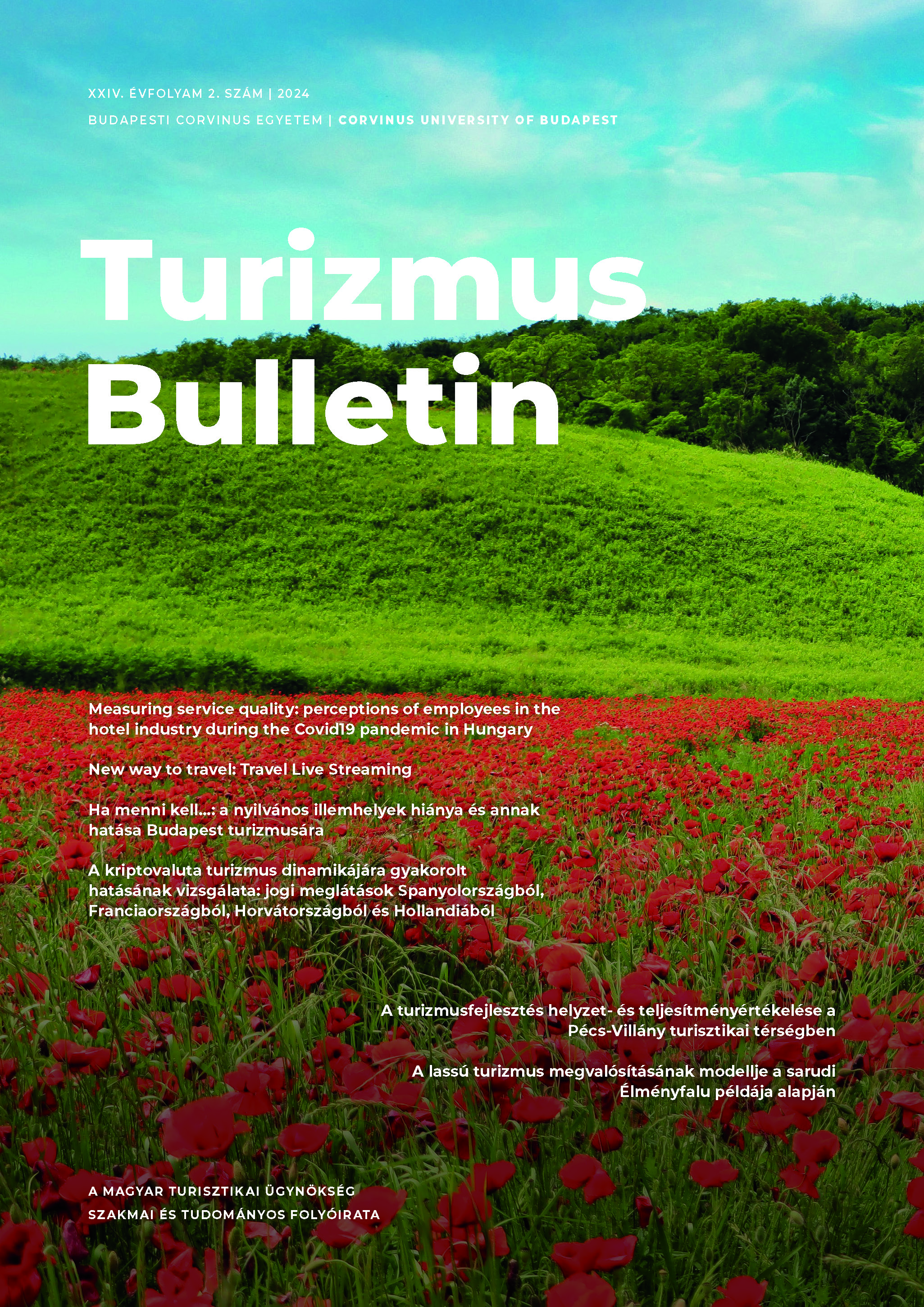A kriptovaluta turizmus dinamikájára gyakorolt hatásának vizsgálata: jogi meglátások Spanyolországból, Franciaországból, Horvátországból és Hollandiából
DOI:
https://doi.org/10.14267/TURBULL.2024v24n2.4Kulcsszavak:
kriptovaluták, turizmus, jogi szabályozás, blokklánc technológia, okosszerződésekAbsztrakt
A kutatás a kriptovaluták turizmusra gyakorolt hatását elemzi, valamint megvizsgálja, hogy a digitális valutákra vonatkozó szabályozások hogyan befolyásolják a turisztikai szektor dinamikáját. Spanyolországban, Franciaországban, Horvátországban és Hollandiában a kriptovaluták turizmusban való használatának és a jogi szabályozások hatásainak feltérképezése a cél. A kutatási módszertan klaszterező neurális hálózatok és adatelemzési technikák, mint például a SOM és a PCA, alkalmazását foglalja magában. Az adatgyűjtés scraping módszerrel történt, így részletes betekintést nyerhettünk a vizsgált országok kriptovaluta-elfogadási pontjaiba. Az eredmények rávilágítanak, hogy a blokklánc-technológiák növekvő hatással vannak a turizmusra, és az EU jogszabályainak jelentős hatása van a digitális tranzakciókra. A kriptovaluták és a blokklánc-technológiák egyre fontosabb szerepet töltenek be, és meghatározó a jogi szabályozás is. A turizmus és a digitális technológiák kapcsolatának további kutatása fontos a változó jogi környezet miatt.
Hivatkozások
BALASUBRAMANIAN, S. – SETHI, J. S. – AJAYAN, S. – PARIS, C. M. (2022): An enabling Framework for Blockchain in Tourism. Information Technology & Tourism. 24. pp. 165–179. https://doi.org/10.1007/s40558- 022-00229-6
CAYAS, J. D. (2018): Regulation of Cryptocurrencies and Initial Coin Offerings in Switzerland: Declared Vision of a ‘Crypto Nation’. NYSBA International Law Practicum. 31(1). pp. 53–60.
CSORDÁS T. – IRIMIÁS A. – KISS K. (2022): Digitalizáció-vezérelt innovációk a turizmusban – fókuszban a fogyasztói magatartás. Turizmus Bulletin. 22(4). pp. 16–25. https://doi. org/10.14267/TURBULL.2022v22n4.2
ERCEG, A. – DAMOSKA SEKULOSKA, J. – KELIĆ, I. (2020): Blockchain in the Tourism Industry – A Review of the Situation in Croatia and Macedonia. Informatics. 7(1):5. https://doi. org/10.3390/informatics7010005
EROL, I. –NEUHOFER, I. O. – DOGRU, T. – OZTEL, A. – SEARCY, C. – YORULMAZ, A. C. (2022): Improving sustainability in the tourism industry through blockchain technology: Challenges and opportunities. Tourism Management. 93. 104628. https://doi. org/10.1016/j.tourman.2022.104628.
FOROUHID, A. E. – KHOSRAVI, S. – MAHMOUDI, J. (2023): Noise Pollution Analysis Using Geographic Information System, Agglomerative Hierarchical Clustering and Principal Component Analysis in Urban Sustainability (Case Study: Tehran). Sustainability. 15(3). 2112. DOI: 10.3390/su15032112
GANS, J. S. (2019): The fine print in smart contracts. NBER Working Paper Series. 25443.
HAPP É. – IVANCSÓNÉ HORVÁTH ZS. – KUPI M. (2020): Digitális eszközök és módszerek használatának marketingszempontú feltáró elemzése a magyar turisták körében. Turizmus Bulletin. 20(2). pp. 4–13. https://doi.org/10.14267/ TURBULL.2020v20n2.1
HUANG, F. – YANG, J. – ZHANG, B. – LI, Y. (2020): Regional terrain complexity assessment based on principal component analysis and geographic information system: a case of Jiangxi province, China. ISPRS International Journal of Geo-Information. 9(9). 539. DOI: 10.3390/ijgi9090539
KOO, C. – PARK, J. – LEE, J. N. (2017): Smart tourism: Traveller, business, and organizational perspectives. Information and Management. 54(6). pp. 683–686. https://doi.org/10.1016/j. im.2017.04.005
KWOK, A. O. J. – KOH, S. G. M. (2018): Is blockchain technology a watershed for tourism development? Current Issues In Tourism. pp. 1–6. https://www. researchgate.net/publication/327235014
NAM, K. – DUTT, C. S. – CHATHOTH, P. – KHAN, M. S. (2019): Blockchain technology for smart city and smart tourism: latest trends and challenges. Asia Pacific Journal of Tourism Research. 26(4). pp. 454–468. https://doi.org/10. 1080/10941665.2019.1585376
ÖNDER, I. − TREIBLMAIER, H. (2018): Blockchain and tourism: Three research propositions. Annals of Tourism Research. 72. pp. 180−182. https://doi.org/10.1016/j.annals.2018.03.005
PHILLIP, A. – CHAN, J. S. K. –PEIRIS, S. (2018): A new look at Cryptocurrencies. Economics Letters. 163. pp. 6–9. https://doi.org/10.1016/j. econlet.2017.11.020
PRADOS-CASTILLO, J. F. – MARTINEZ, J. M. G. – ZIELINSKA, A. – COMAS, D. G. (2023): A review of blockchain technology adoption in the tourism industry from a sustainability perspective. Journal of Theoretical and Applied Electronic Commerce Research. 18(2). pp. 814-830. https://doi.org/10.3390/jtaer18020042
SHEN, Y. – BAY, G. (2020): Research on Application of Blockchain in Internationalisation of China’s Medical Tourism Industry. 2020 International Signal Processing, Communications and Engineering Management Conference (ISPCEM). Montreal, QC, Canada. pp. 63–67. IEEE. https:// doi.org/10.1109/ISPCEM52197.2020.00018
STRIESSNIG, E. – BORA, J. K. (2020): Under five child growth and nutrition status: spatial clustering of Indian districts. Spatial Demography. 8. pp. 63–84. https://doi.org/10.1007/s40980- 020-00058-3 SZABO, N. (2020): Smart Contracts: Building Block for Digital Markets. Indira Ghandi National Open University.
THEES, H. – ERSCHBAMER, G. – PECHLANER, H. (2020): The application of blockchain in tourism: use cases in the tourism value system. European Journal of Tourism Research. 26. 2602. https://doi.org/10.54055/ejtr.v26i.1933
TYAN, I. – YAGÜE, M. I. – GUEVARA-PLAZA, A. (2020): Blockchain Technology for smart tourism destinations. Sustainability. 12(22). 9715. https://doi.org/10.3390/su12229715
VALERI, M. − BAGGIO, R. (2021): A critical reflection on the adoption of blockchain in tourism. Information Technology & Tourism. 21. pp. 121−132. https://doi.org/10.1007/s40558- 020-00183-1
Internetes források
DOGRU, T. – MODY, M. – LEONARDI, C. (2018): Blockchain Technology and its Implications for the Hospitality Industry. Boston Hospitality Review. https://www.bu.edu/bhr/ files/2018/02/Blockchain-Technology-and-its Implications-for-the-Hospitality-Industry.pdf Letöltve: 2023. október 6.
EUROPEAN COMMISSION (2023a): European Capital of Smart Tourism. https://smart-tourism capital.ec.europa.eu/about/european-capital smart-tourism_en Letöltve: 2023. október 14.
EUROPEAN COMMISSION (2023b): Smart cities. https://commission.europa.eu/eu-regional and-urban-development/topics/cities-and urban-development/city-initiatives/smart cities_en Letöltve: 2023. október 14.
EUROSTAT (2023a): Table: Nights spent at tourist accommodation establishments by NUTS 3 regions (from 2020 onwards). European Commission. https://ec.europa.eu/eurostat/databrowser/ view/tour_occ_nin3/default/table?lang=en Letöltve: 2023. október 13.
EUROSTAT (2023b): Table: Tourism Accommodation Establishments (TOUR_OCC_NINAT). European Commission. https://ec.europa.eu/eurostat/ databrowser/view/TOUR _OCC_NINAT/ default/table?lang=en Letöltve: 2023. október 13.
EUROSTAT (2022): Tourism statistics. https:// ec.europa.eu/eurostat/statistics-explained/ index.php?title=Tourism_statistics Letöltve: 2023. október 14.
NAKAMOTO, S. (2008): Bitcoin: A peer-to-peer electronic cash system. https://bitcoin.org/ bitcoin.pdf Letöltve: 2023. október 14.
SEC (Securities and Exchange Comission) (2024): Statement on the Approval of Spot Bitcoin Exchange Traded Products. January 10, 2024. https://www. sec.gov/news/statement/gensler-statement-spot bitcoin-011023 Letöltve: 2024. február 23.
UNEP (United Nations Environment Programme) (2005): Making tourism more sustainable – A guide for policy makers. UNEP-WTO. https://wedocs. unep.org/ Letöltve: 2023. október 6.
UNWTO (2023a): Tourism data and matching priorities: France. https://www.unwto.org/ europe/france Letöltve: 2023. október 14.
UNWTO (2023b): Tourism data and matching priorities: Spain. https://www.unwto.org/ europe/spain Letöltve: 2023. október 14.
UNWTO (2023c): Tourism data and matching priorities: The Netherlands. https://www.unwto.org/ europe/netherlands Letöltve: 2023. október 14

